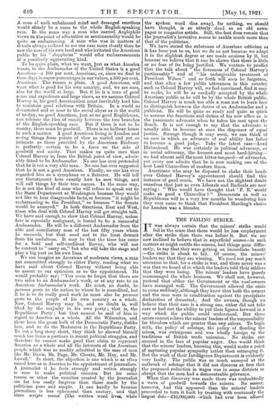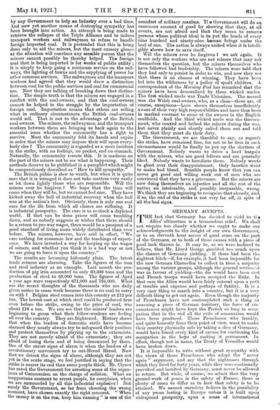THE FAILING STRIKE.
IT was always certain that the miners' strike would fail in the sense that there would be less employment after the strike than there was before it. But we are now inclined to believe that in superficial senses—in such matters as might entitle the miners, had things gone differ- ently, to say that they were getting an immediate benefit the strike is about to fail. Of course, the miners' leaders say that they are winning. We need not pay much attention to that, for a strike is war, and there never was a war that we heard of in which the leaders told their soldiers that they were losing. The miners' leaders have grossly mismanaged the whole business. We shall not, however, pretend that either the Government or the coal-owners have managed well. The Government allowed the crisis to come suddenly, although they knew that both the owners and the men were in combination against the precipitate declaration of decontrol.j And the owners, though we believe that their case is a strong one, either did not take care or had not the ability to put their figures forward in a way which the public could understand. But these errors cannot relieve the miners' leaders of the responsibility for blunders which are greater than any others. To begin with, the policy of sabotage, the policy of flooding the mines, was outrageous and was wholly foreign to the traditions of British trade unionism. No strike can succeed in the face of popular anger. One would think that the miners' leaders, knowing this, would make a point of capturing popular sympathy rather than estranging it. But the work of their Intelligence Department is evidently very faulty. The public was so much annoyed at the outbreak of sabotage that it did not discover at first that the proposed reduction in wages was in some districts so abrupt that the men had a demonstrable grievance. When that discovery was made there was undoubtedly a wave of goodwill towards the miners. No sooner, however, had this appeared than the miners' leaders proceeded to turn it back by treating with contumely the largest dole—L10,000,000—which had ever been offered by any Government to help an industry over a bad time. And now yet another means of destroying sympathy has been brought into action. An attempt is being made to retrieve the collapse of the TripleAlliance and to induce transport workers and railwaymen to refuse to handle foreign imported coal. It is pretended that this is being done only to aid the miners, but the most cursory glance at the situation will convince any sensible person that the miners cannot possibly be thereby helped. The foreign coal that is being imported is for works of publio utility ; it is simply to keep going a minimum service on the rail- ways, the lighting of towns and the supplying of power for other common services. The railwaymen and the transport workers had agreed that they would draw a distinction between coal for the public services and coal for commercial use. Now they are talking of breaking down that distinc- tion. The simple truth is that the miners are engaged in a conflict with the coal-owners, and that the coal-owners cannot be helped in the struggle by the importation of foreign coal. Importation means that others are selling what in ordinary circumstances the British coal-owners would sell. That is not to the advantage of the British coal-owners. The miners, the railwaymen, and the transport workers between them are bringing us back again to the essential issue whether the community has a right to survive. Must the community fold its hands and expire in order that the miners may impose their will upon every- body else ? The community is regarded as a mere incident in the strike, with no feelings, no pocket, and no stomach. Naturally, the community resents this. It is madness on the part of the miners not to see what is happening. Their methods deserve to be published in a pamphlet which might be compendiously described as " How to kill sympathy.' The British public is slow to wrath, but when it is quite sure that it is wronged it does not take matters very easily or let down lightly those who are responsible. Will the miners ever be forgiven ? We hope that the time will come when they will be, but we cannot feel sure. They have kicked away the ball of industrial recovery when the ball was at the nation's feet. Obviously, there is only one real cure for the ills from which all classes are suffering. It is industrial prosperity. The cure is to re-stock a depleted world. If that can be done prices will come tumbling down, and as nobody suggests or wishes that there should be a return to pre-war wages, there would be a prospect of a good standard of living more widely distributed than ever before. The miners, however, have said in effect, " We care nothing for economic law and the teachings of experi- ence. We have invented a way for keeping up the wages of miners, and whether you think it is a bad way or not we are going to force it upon the country."
The results are becoming hideously plain. The latest trade returns are alarming. Take the figures of the iron and steel industry as an example. Last month the pro- duction of pig iron amounted to only 60,300 tons and the production of steel to 68,000 tons. The figures of April a year ago were respectively 671,000 and 794,000. What are the secret thoughts of the thousands who are daily given notice to cease work because there is no coal to carry on with ? Belgian steel comes into this country at £12 per ton. The lowest cost at which steel could be produced here even before the strike, owing to the price of coal, was about £16 a ton. We can see that the miners' leaders are beginning to guess what their fellow-workers are feeling all over the country. They are frightened. History shows that when the leaders of domestic strife have become alarmed they nearly always try to safeguard their position and protect themselves by playing up to the extremists. They are not merely afraid of the extremists ; they are afraid of losing them and of being denounced by them. One of the surest signs of alarm is when the leaders of a revolutionary movement try to out-Herod Herod. Now that we detect the signs of alarm, although they are not yet in the acute stage, we feel justified in saying that the strike is nearer its end than some people think. Mr. Clynes has rated the Government for arresting some of the organ- izers of Communism on the charge of sedition. What an inopportune moment to arrest people, he complains, when we are surrounded by all this industrial exylosive 1 But Barely the Government, so far from choosing the wrong moment, have chosen exactly the right moment. " When the enemy is on the run, keep him running " is one of the soundest of military maxims. T1* Government will do an enormous amount of good by showing that they, at all events, are not afraid and that they mean to remove persons whose political ideal is to put the heads of every nine hundred and ninety-nine human beings under the heel of one. The nation is always united when it is intelli- gibly 'hewn how to save itself.
Will the miners ever be forgiven I we ask again. It is not only the workers who are not miners that may ask themselves the question, but the miners themselves who have followed bad leadership. The miners were told that they had only to persist in order to win, and now they see that there is no chance of winning. They have been led into the wilderness by a policy of spoilt children. A correspondent of the Morning Post has remarked that the miners have been demoralized by three wicked uncles. The first wicked uncle was Trade Unionism. The second was the Welsh coal-owners, who, as a class—there are, of course, exceptions—have shown themselves insufficiently aware of their very high responsibilities and have thus been in marked contrast to some of the owners in the English coalfields. And the third wicked uncle was the Govern- ment, who coaxed and bribed the miners during the war, but never plainly and shortly called them out and told them that they must do their duty. The Government, we are thankful to say, as regards the strike, have remained firm, for not to be firm in such circumstances would be finally to put up the shutters of Government. Nobody wants to drive a hard bargain with the miners, who are good fellows and are generally liked. Nobody wants to humiliate them. Nobody wants to gloat over their disappointment. Only fanatics want to make bad blood. Sensible people know that you can never getgood and willing work out of men who arc convinced that they have a grievance. But the miners are now doing themselves an injustice and all the rest of the nation an intolerable, and possibly irreparable, wrong. We think they are beginning to recognize that already, and, if so, the end of the strike is not very far off, in spite of all the bad signs.



































 Previous page
Previous page